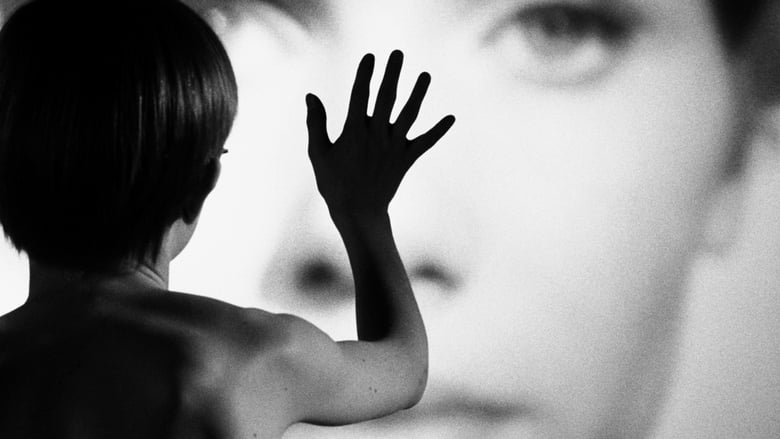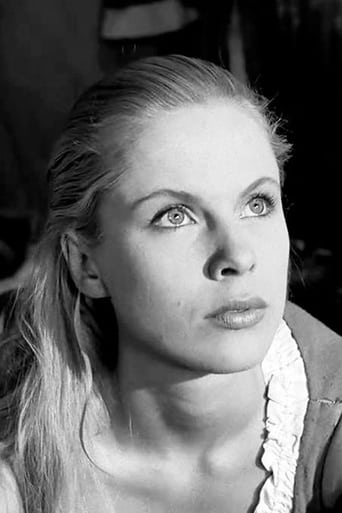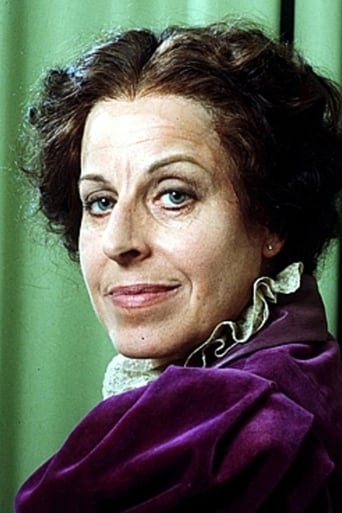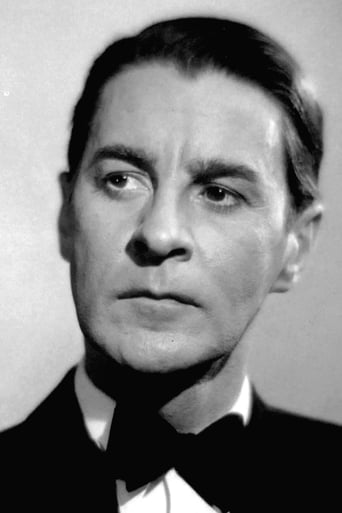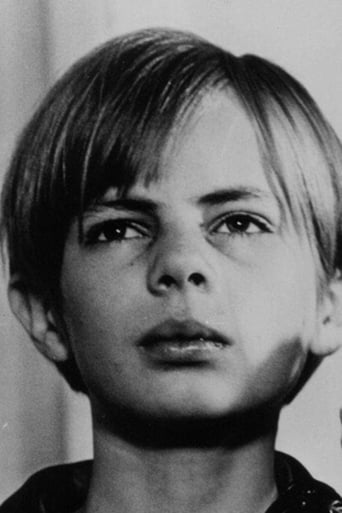A young nurse, Alma, is put in charge of Elisabeth Vogler: an actress who is seemingly healthy in all respects, but will not talk. As they spend time together, Alma speaks to Elisabeth constantly, never receiving any answer. The time they spend together only strengthens the crushing realization that one does not exist.
Similar titles









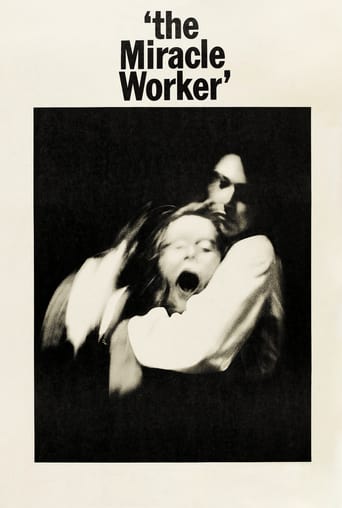
You May Also Like
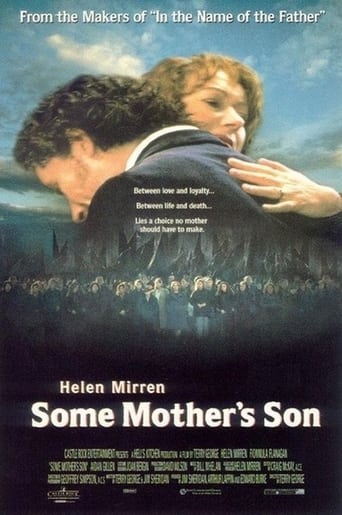

Reviews
i must have seen a different film!!
The acting in this movie is really good.
True to its essence, the characters remain on the same line and manage to entertain the viewer, each highlighting their own distinctive qualities or touches.
Very good movie overall, highly recommended. Most of the negative reviews don't have any merit and are all pollitically based. Give this movie a chance at least, and it might give you a different perspective.
I am waking from a dream. And as I look out the window it seems I should see the ocean.Not much feels right as the memory of what I've seen fades.Light and the absence of light control my face as it did hers. One pale one unseen.To what to wonder. What a wonder too.I am still stuck.
Film historian and professor Thomas Elsaesser once said "...writing about Persona has been for film critics and scholars what climbing Everest is for mountaineers: the ultimate professional challenge." I completely agree with him. Despite being under 90 minutes, this film is probably one of the most complex films I've run into in years. After I finished it, I didn't even know where to start when attempting to analyze it. However, after thinking about it for a little bit, I formed a basic summary for it, and things kept going uphill from there.A nurse named Alma is put in charge of a mute actress named Elisabet Vogler. She talks to her numerous times without ever receiving an answer. Eventually, the 2 go to a beach house. After living with each other for a little while, the story twists into a bizarre and complex story beyond realism.Many of the analysis's that I've read argue that either Alma is Elisabet's persona or vice versa. Those are interesting interpretations. However, I think that both women are personas of the boy we see at the beginning and, briefly, at the end of the film. In the movie, we learn that both Alma and Elisabet got pregnant and had an abortion. We also learn that Elisabet's baby survived, and she gave him away to a nanny. I think that that is what happened to the boy. When I was first introduced to him, I got a slight vibe that he's being mistreated at his current home since his bed looked really unappealing. He wasn't given a pillow and he only had one thin bed sheet. He also didn't have much clothes on. I felt like he could've been slightly insecure due to his seemingly poor treatment (this explains some of the seemingly random imagery at the beginning and the middle of the film, although I'm not sure about the film reels).With that being said, I think that the personas of the 2 women represented the boy's depiction of his mother. He likely has a negative opinion of his mom since she abandoned him and left him in a dull environment. It seems like he's punishing both of the women initially. Elisabet is being punished as he's not allowing her to talk. Alma's initial punishment is a little harder to figure out, but it's possible that the boy finds her having to watch over an insane patient (Elisabet) as a punishment since they become isolated with each other. After Alma tells of how she got pregnant, we can assume that the boy is especially upset at her due to the different things that happen to her. We see that Elisabet is trying to mail Alma's sex story to the public, Elisabet gives her a bloody nose in a fight, and Alma is negatively effected when Elisabet attempts to leave her alone at the beach house (she breaks down crying at one point). This goes on for a little while, but we see the boy change his focus after Elisabet reveals a similar story which seems more plausible since we learn that she was unable to abort her baby. This scene is famously repeated in the film, which could mean that the boy is trying to confirm that it really was her.Bergman usually nails cinematography really well in his films. Bergman also handled the visual aspect expertly in this movie as well. It is, quite possibly, the most visually impressive of his films. Images of the beach and cleverly lit rooms are beautiful to look at. There are also some scenes which have a somewhat surreal quality to them. The movie is able to use simple camera movements to create these. An early example of this is when Alma is talking to the Doctor near the beginning. The camera is usually pointed at her for most of their conversation, and on the 2nd time she meets with her, the camera is only focused on Alma, and we just hear the doctor's voice. There are several of these shots throughout the film. I also really liked the surreal imagery at the beginning of the film. It made that sequence really memorable, and it informed me of the complicated film that would follow it. Also, on my re-watch, I noticed how the movie constantly focused on hands. There were numerous shots which seemed to draw attention to hands almost like it was a motif. These shots tended to stick out quite a lot. It's possible that those shots were supposed to represent reaching out into the unfathomable depths of someone. This fits in with the scene at the beginning pretty well when the boy reaches out and touches a screen with both women's faces on it. I think that Bergman was sort of giving us a clue as how to go about interpreting his film.In conclusion, this movie is a masterpiece. It's incredibly complicated with a lot of obscure imagery and set pieces, and it has great visuals as well. It's always great to see a challenging film which requires you to think every now and then. This movie, however, feels incredibly complicated and more so than other complex films that I've seen. I didn't enjoy Bergman's "The Seventh Seal" that much, but this movie was definitely worth my time. I'm going to look into Bergman more in the future.
After a series of images including a crucifixion, tarantula and the killing of a lamb, a boy wakes up in a hospital or morgue and pulls up to a large screen, which shows a blurred image of one or two women. One of these women is possibly Alma, a young nurse who is assigned by a doctor to see a patient, Elisabet Vogler. Elisabet is a stage actress who has suddenly fallen silent and still, although the doctors have determined it is not a result of physical illness or hysteria, but willpower. While at the hospital, Alma reads Elisabet a letter from her husband, which comes with a photo of their son that Elisabet tears. She also becomes distressed seeing TV footage of monk Thích Quảng Đức's self-immolation in the Vietnam War. The doctor decides Elisabet will recover better in a cottage by the sea, and sends Alma and Elisabet there.While at the cottage, Alma talks to Elisabet, remarking no one has ever really listened to her before. She speaks about her first affair and her fiancé, Karl-Henrik. One night, she relates how, while in a relationship with Karl-Henrik, she was sunbathing in the nude with a woman she had just met named Katarina, when two young boys came along. Katarina initiated an orgy in which Alma became pregnant, and she had an abortion, feeling guilty about the matter.
During the opening to this film, I had no idea what kind of movie I was watching. It shows film unrolling in a projector, gore, a strange silent film for a few seconds, and finally an old woman, cut in with pictures of a young boy, laying down in seemingly the same room. We see him wave his hand in front of what seems to be a large screen. We see our main characters appear. The credits start. I think this montage is to show us that we are watching a film, and the potential for what it can be at that moment is endless, considering its up to the creator to decide. This fits in with what we learn about Elisabet Vogler, an actress who suddenly, during an audition, got silent, and had a "sudden urge to laugh", and she has not said a word since. We learn she does have a husband and a life, and she even clearly cares for him, so this sudden change is perplexing to many. But it is this sudden change that shows that the individual is completely in control of their persona, and can change it at any minute. In fact, we all do it, as demonstrated by the nurse of Elisabet, Alma. Almost daily we change our outward personality depending on who we are with and when and where. The film suggests we are almost never exactly who we are on the inside. But the most thought provoking question the film presents is this: can we change who we are on the inside?The answer is yes throughout the film. Alma, at one point in the film, has a long monologue about a boy she slept with on a beach, how it was the best sex ever (yet she still feels guilty), how she got pregnant from the kid (but had sex with her husband the same night), and how her husband and her both got an abortion, but were happy they did. She mentions that she felt like a different person when it was happening. Throughout the film it seems that the two characters are merging into one, and my theory is that they are both the same person. When Alma is delivering the mail for Elisabet, she realizes her mail isn't sealed, and checks it. It involves Almas personal story, and it says that Elisabet is studying Alma. Alma feels offended and wants to get her to finally stop and talk. There is a long scene involving Elisabet walking around and finally stepping on a shard of glass Alma accidentally shattered, this seems to be Alma attempting to get Elisabet to talk, or react in any way, but all she hears is "ow!". Suddenly, Elisabet's husband finds her and Alma, but Alma is talking to him. At first she says, "I am not your wife". But he goes on about how "you love somebody, or say you do... it gives you security, a chance to endure, doesn't it?" which calls back to Alma earlier in the film when she reads her letter to Elisabet that was from Mr. Vogler, and both times he mentions that they both treat each other as "anxious children", and what matters is their intentions. This also calls back to when Alma reads "all our faith and doubt is evidence of our loneliness". Elisabet stands in the room as they have sex, but I believe she is only metaphorically there, in that she is a part of Alma and vice versa. The next scene involves Alma talking to Elisabet about her being told she cannot be a mother, then feeling that she needs to prove to herself and others that she can be a good mother then becoming terrified when she gets pregnant then wanting an abortion but having it fail multiple times then hating the child, but the child loved her unconditionally so it was hard. Then, this same scene plays again, only this time we are watching Alma and not Elisabet. This is another nod to the director being able to control the film entirely, but also, at the end of this one, Elisabets face is superimposed over half of Almas. So, if Alma and Elisabet were the same person, why would they have two different stories of getting pregnant and having a successful abortion and one failed abortion? I believe the failed abortion is true, but Elisabet is Almas suppressed true inner feeling of being an "actor" in everyday life. She sometimes plays different roles, during the pregnancy, the role of the happy expectant mother. Of course these almost never align with her inner self, as stated before. But ultimately it shows that we all have multiple "people" to us, even on the inside. And sometimes we can even convince ourselves that we are a different type of person for our own sake. I think Elisabet does this when she invents Alma, who had a successful abortion. Of course we never go as far as literally convincing ourselves that something different happened to us in the past, but it's a metaphor for how we choose different personalities even internally. Life may seep back through and prevent us from doing so, but we go back to hide ourselves from the horrors of the world.This is a very complex movie, especially for taking up only a short 85 minutes of my day, but I can promise it will inhabit your mind for much longer than that. It cuts from past to present at random, blurs the lines between reality and fantasy, and sometimes deviates completely from the main story to show us that we're watching a film with strange montages. It's about life, the human race, our psychology, film itself, and sometimes nothing at all. It's the most perplexing film I've seen since "Last Year At Marienbad" and thats intentionally perplexing. I mean all of this in the best way. It is one of a kind.
Top Streaming Movies











